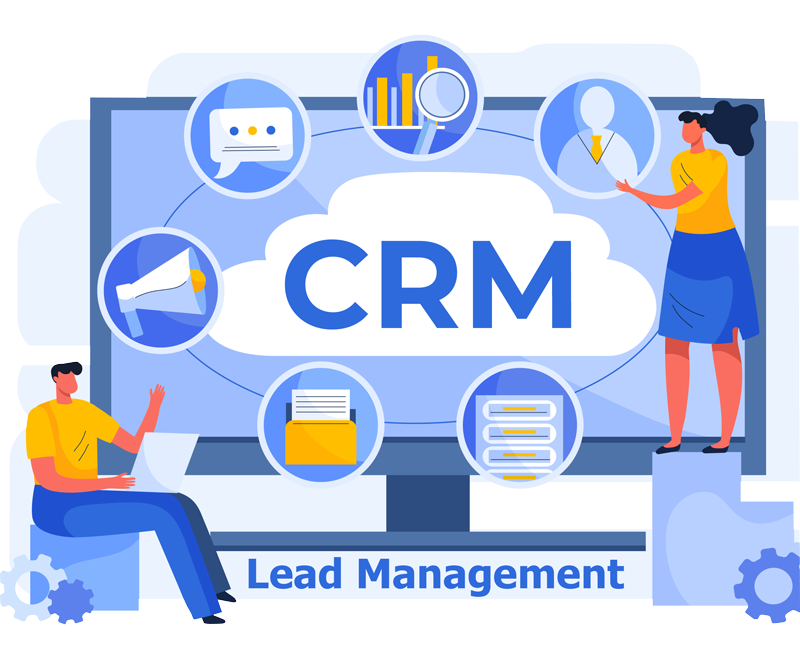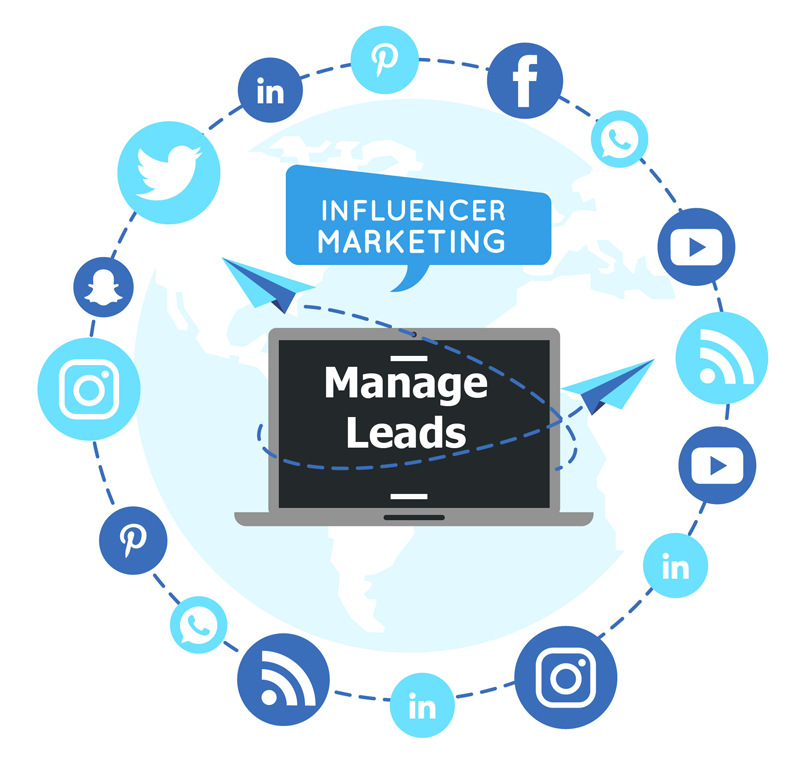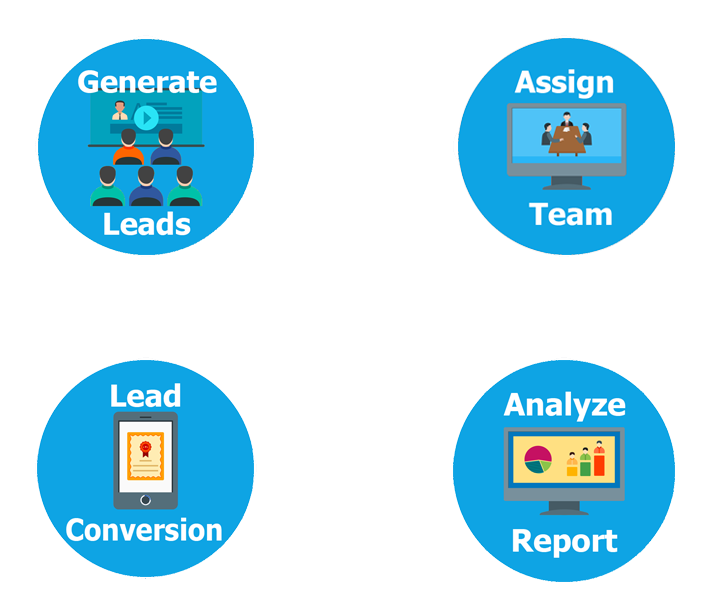


What is Customer Relationship Management
A Customer Relationship Management (CRM) system is a software tool or platform that businesses use to manage their interactions and relationships with customers. It allows organizations to streamline and centralize their customer data, track customer interactions, and automate various sales, marketing, and customer service processes.

CRM Lead Nurturing Process
- Define Lead Nurturing Goals: Determine the objectives of your lead nurturing process, such as converting leads into customers, increasing engagement, or accelerating the sales cycle.
- Segment Leads: Categorize leads based on their characteristics, interests, or behaviors to deliver targeted and personalized content.
- Develop Content Strategy: Create relevant and valuable content that addresses the needs and pain points of different lead segments.
- Automate Email Campaigns: Set up automated email workflows to deliver timely and targeted content to nurture leads at various stages of the sales funnel.
- Personalize Communication: Tailor messages and offers based on lead preferences and behaviors to enhance engagement and build trust.
- Track Lead Interactions: Monitor lead engagement with your content, emails, and website to identify their level of interest and adjust your nurturing strategy accordingly.
- Score and Prioritize Leads: Assign lead scores based on their interactions and attributes to focus resources on the most promising leads.
- Sales and Marketing Alignment: Ensure close collaboration between sales and marketing teams to share insights, feedback, and nurture leads effectively.
- Measure and Optimize: Analyze the performance of your lead nurturing campaigns, identify areas for improvement, and refine your approach based on data and feedback.
- Continuous Lead Nurturing: Maintain ongoing communication with leads, providing relevant information, offers, and support even after conversion to foster long-term customer relationships.
Assign CRM Leads to the Sales Team Process
- Lead Qualification: Determine criteria for qualified leads based on demographics, behavior, or engagement level
- Lead Scoring: Assign scores to leads based on their fit and level of interest to prioritize follow-up.
- Lead Assignment rules: Establish rules and criteria for distributing leads among the sales team, considering factors like territory, expertise, or workload.
- Automated Lead Assignment: Utilize CRM automation to automatically assign leads based on predefined rules, ensuring fair distribution and efficient allocation of resources.
- Round-robin Allocation: Implement a round-robin system where leads are evenly distributed among sales team members in rotation.
- Lead Notification: Notify the assigned sales representative about the new lead, providing relevant lead details and context.
- Follow-up Timeline: Establish a timeline for sales team members to follow up with assigned leads promptly, ensuring timely engagement and response.
- Collaboration and Communication: Enable seamless communication and collaboration within the sales team to share insights, updates, and progress on lead follow-up.
- Lead Tracking and Updates: Track lead progress within the CRM system, allowing sales team members to update lead status, record interactions, and schedule follow-up tasks.
- Performance Monitoring: Monitor the conversion rates and performance of sales team members in handling assigned leads to identify areas for improvement and provide necessary support or training.

What Is Sales Lead Management And Why It Matters
Sales lead management refers to the process of effectively managing and tracking sales leads from the initial contact to the final conversion or sale. It involves the systematic handling of leads to ensure that they are nurtured, followed up on, and eventually converted into paying customers. Sales lead management is an integral part of the sales process and plays a vital role in the success of a business. Here are some reasons why sales lead management matters

Increased Efficiency
Implementing a structured lead management process allows sales teams to prioritize and focus their efforts on the most promising leads. It helps save time on unqualified or low-priority leads, ensuring that salespeople are spending their time and resources on leads with the highest potential for conversion. This increased efficiency leads to improved sales productivity and higher conversion rates.

Better Lead Tracking and Follow-up
Sales lead management provides a systematic approach to track leads and their interactions with the business. It ensures that no leads fall through the cracks and that timely follow-up actions are taken. By having a clear view of lead activity and history, sales teams can tailor their communication and engagement strategies, resulting in more effective interactions and increased chances of conversion.

Enhanced Lead Nurturing
Many leads are still waiting to be ready to make a purchasing decision when they first engage with a business. Lead management enables businesses to nurture these leads over time, building relationships and providing valuable information and resources to educate and guide them through the buying journey. By maintaining regular contact and delivering relevant content, businesses can stay top-of-mind with leads and increase the likelihood of conversion when the leads are ready to make a purchase.

Improved Sales Forecasting and Planning
Effective lead management provides insights into the sales pipeline, including the number of leads at each stage, conversion rates, and average sales cycle length. This data helps sales managers forecast future revenue, set realistic sales targets, and allocate resources effectively. It also enables businesses to identify bottlenecks or areas where the sales process can be optimized to improve conversion rates and revenue generation.

Alignment Between Sales and Marketing
Lead management promotes collaboration and alignment between the sales and marketing teams. It ensures that marketing efforts are generating quality leads that are valuable to the sales team. Sales and marketing teams can work together to define lead qualification criteria, develop targeted messaging, and share feedback and insights to continuously improve lead generation and conversion.

Measurable Results and Improvement
Sales lead management allows businesses to measure the effectiveness of their lead generation and conversion efforts. By tracking key metrics such as lead-to-customer conversion rates, sales velocity, and return on investment (ROI), businesses can identify areas for improvement and make data-driven decisions to optimize their sales processes. This continuous improvement approach leads to better sales performance and overall business growth.
Importance of Lead Customer Relationship Management System
CRM systems provide a holistic view of customer information by consolidating data from various sources, such as emails, phone calls, social media interactions, and website visits. This comprehensive customer database enables businesses to gain insights into customer behavior, preferences, and needs, which in turn helps them tailor their products, services, and marketing efforts to better serve their customers.
Lead Management
Capture and organize leads, track their progress, and ensure timely follow-ups.
Contact management
Store and manage contact information, including details and history of interactions.
Sales Automation
Streamline sales processes, automate tasks, and manage sales pipelines and opportunities.
Marketing Automation
Automate marketing campaigns, track customer responses, and analyze campaign effectiveness.
Customer Service
Manage customer inquiries, complaints, and support tickets, ensuring timely resolution and excellent service.
Integration capabilities
Integrate with other systems for seamless data flow and synchronization.
Customization and Scalability
Customize the CRM system to fit your business needs and scale it as your customer base grows.


Mobile Access
Access CRM functionalities on mobile devices for on-the-go management. Collaboration: Facilitate collaboration and communication among team members for effective customer management.
Analytics and Reporting
Generate reports, analyze customer data, and gain insights for informed decision-making.



eOne Stop Solutions offer Lead Management Services
- Boost your site’s traffic
- Boost social media sales
- Drive more social shares
- Gain more social media followers
- Earn more email subscribers
- Increase email marketing sales
- Increase your website conversion rate
- Increase overall customer conversion rate

